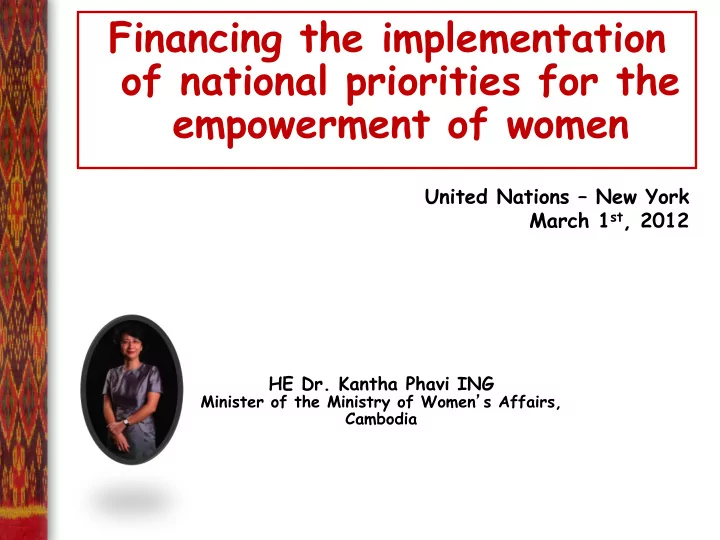

Financing the implementation of national priorities for the empowerment of women United Nations – New York March 1 st , 2012 HE Dr. Kantha Phavi ING Minister of the Ministry of Women ’ s Affairs, Cambodia
Vietnam Laos Thailand Cambodia Phnom Penh
CSW 52 agreed conclusions: Financing for Gender Equality and the empowerment of women 1. Involvement of national machineries and institutional framework 2. Progress, challenges and the way ahead 3. Development/aid effectiveness
Strong Commitment of the RGC to comply with international commitments “ Women are the backbone of Cambodian economy and society ”
Gender a priority in government development strategies & macro policies and reforms • A favourable political commitment and legal framework: equality enshrined in the constitution, ratification of CEDAW & optional protocol, Gender related laws adopted (e.g. DV law, anti-trafficking)… • Gender a priority in national development policy and strategies: rectangular strategy, national strategic development plan, 5 years strategic plan of Ministry of Women’s Affairs (Neary Rattanak = Precious Gems) • Gender mainstreamed in all Cambodian MDGs • Gender a priority in major reforms (Public Administration, Public Financial Management, Decentralisation&Deconcentration, Land Management…)
National machineries & innovative institutional framework To ensure gender concerns are put as priorities of programme at an early stage of planning and taken into account in the budgeting cycles • Cambodian National Council for Women & Ministry of Women’s Affairs (MoWA) active since 90ies. • Technical Working Group on Gender (TWG-G) chaired by MoWA brings sector ministries, NGOs, bi- and multilateral partners & donors together and discuss policies & implementation, share plans & spot needs for action.
National machineries & innovative institutional framework (cont.) • Gender Mainstreaming Action Groups (GMAGs) with more decision power than Gender focal points have been established & functioning in sectorial ministries. • GMAGs in 26 sectorial ministries and in the Council of Ministers provide mechanism to develop sector specific gender mainstreaming strategies and plans, ensure the implementation with their own resources and the monitoring. • 36% of these sector gender plans received funds from national budget, international development partners provide additional support.
Gender responsive budgeting and PBA launched – PFM-RP Consolidated Action Plan 2: Gender consideration clearly integrated into the objective “ Develop Policy on integration of the budget ” with poverty reduction and gender implication into the budget strategic plan and programme budgeting. PFM-RP: Public Financial Management Reform Programme PBA: Programme Based Approach
Gender responsive budgeting and PBA launched (cont.) – MoWA and Ministry of Economy and Finance (MEF) engaged in a Gender Responsive Budgeting (GRB) process with support of UNDP • A manual for practitioners on preparation and implementation of gender responsive budgets is under development, • followed by a ToT to build the first pool of GRB experts in MoWA and MEF, • end of 2012, the Labour ministry (MLVT) will pilot GRB with the support from MEF, MoWA. • A road map under development for PBA on gender equality supported by UNDP and SIDA
Progress on MDGs, challenges and way ahead • Education: gender disparity eliminated in primary & lower secondary, Focus is now on increasing % girls in higher education & literacy of 1/3 of adult women. • Health: MMR decreased (437 deaths per 100,000 live births in 1997 to 206 in 2011!), HIV infection dropped (1998: 2%, 2010: 0,8%) -Cambodia received the MDGs Award 2010. • Women in public admin & decision making: National Assembly: 22%, elected commune councillors: 14.6 %, provincial deputy governors: 24%, women civil servants: 34% (MDG target 2015: 38%)
Progress on MDGs, challenges and way ahead (cont.) • Cambodian women the most economically active in Asia but mostly in informal sector: 82%, in garment sector:90% (young rural women mostly) • Our aim: to increase women’s proportion in the formal sector, where they make less than a third. • Law on domestic violence adopted, a National Action Plan to Combat Violence against Women approved and implemented, integrated services (e.g. OSSC) are underway OSSC: One Stop Service Centre
Aids effectiveness and aid coordination mechanisms: need for more resources for gender equality & more joint monitoring & evaluation indicators!
Thank you
Recommend
More recommend